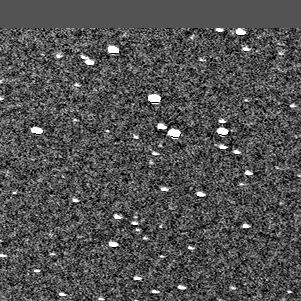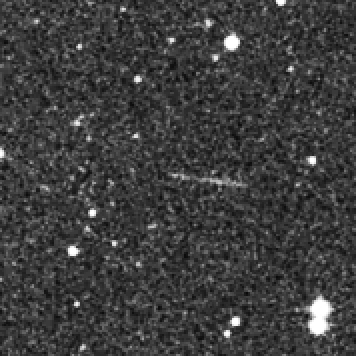At the 2004 CWP consortium meeting, there was a celebration honoring Ken Larner, who was retiring as head of the consortium. Ken's wife was asked, "what would Ken most like to have for a retirement present?", and the answer was "a place in heaven!".
Well, a chunk of rock approximately 2 kilometers across is probably not exactly what Ken had in mind, but it's the best I could arrange.
Fellow Geophysicist and Fort Bend Astronomy Club asteroid-team member Bill Dillon agreed to naming asteroid 2001 SK10, which we co-discovered in 2001, for Ken. (It generally takes about 4 years of following an asteroid before it becomes permanently numbered and eligible for naming.)

Here are our discovery images. The first image is shown for twice as long as the later two images. The image has been cropped so that the asteroid is right in the very middle of the image in the first frame. It is just above and to the left of a star. In the later two images it brightens and jumps to the right side of that star. These images date to 2001 Sept. 16.25-16.32.

Here is a streak image of the asteroid KenLarner moving among the fixed stars, caught accidentally on a Palomar Digital Sky Survey photographic plate taken Nov. 18, 1990. The length of the exposure is 95 minutes, so this streak represents 95 minutes' worth of motion. The average magnitude of the asteroid in this image is V=18.5. This "precovery" image was found by Canadian geophysicist and computational astronomer Andrew Lowe. The positional data extracted from it was submitted to the Minor Planet Center and used to help refine the asteroid's orbit.
Kenlarner 55276 Ken Larner, geophysicist
(55276) Kenlarner = 2001 SK10
Discovered 2001 September 16 by Joe Dellinger and William G. Dillon at
the George Observatory, Brazos Bend State Park, Needville, Texas.
Ken Larner (b. 1938), husband of Nancy (b. 1943), is a world-renowned
exploration geophysicist recognized for his quiet leadership skills. His
distinguished career includes leadership positions at Western Geophysical
and the Colorado School of Mines, where he directs the Center for Wave
Phenomena.
Here is the official orbital specification from the Minor Planet Ephemeris Service:
(55276) Kenlarner Epoch 2005 Jan. 30.0 TT = JDT 2453400.5 MPC M 218.81667 (2000.0) P Q n 0.26132120 Peri. 78.63509 -0.39500531 -0.91724545 a 2.4229974 Node 34.77264 +0.80390165 -0.37214225 e 0.1393244 Incl. 5.16060 +0.44464924 -0.14202444 P 3.77 H 15.5 G 0.15 U 2 From 71 observations at 4 oppositions, 1990-2003, mean residual 0".76.
Happy retirement, Ken!